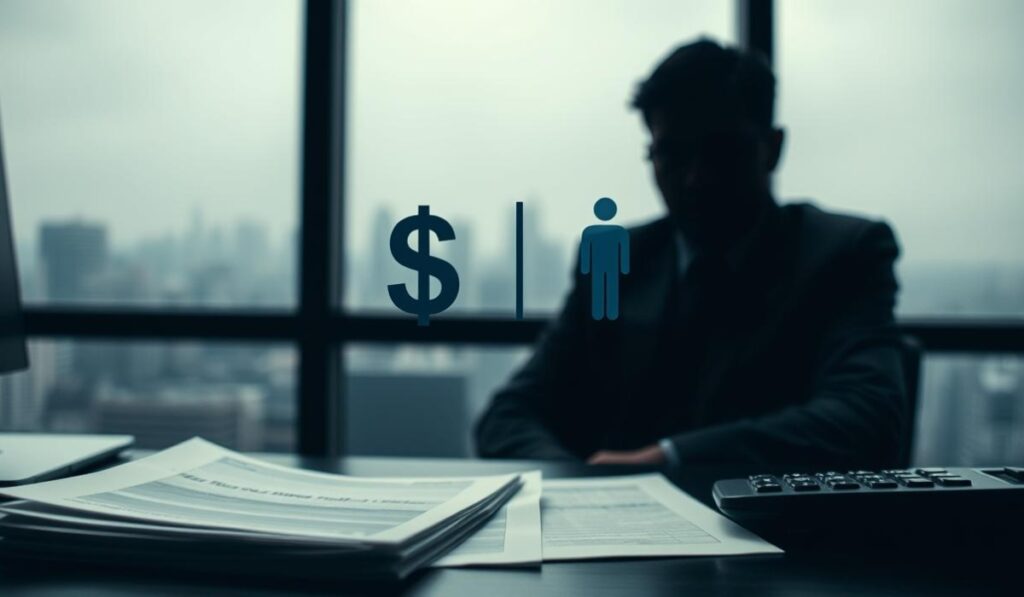Did you know that nearly 60% of employees have seen or faced unethical actions at work? A recent survey found this. It shows how big the problem of ethics in decision making is in many fields.
When people choose personal benefits over doing the right thing, it can cause huge problems. This is true for companies and society. Thinking about these choices helps us see why we need to understand the dark side of ethics in decision making. It’s key to building a culture based on honesty.
Key Takeaways
- Unethical behavior is common in many workplaces.
- Ignoring ethics can lead to serious issues.
- Sticking to moral values is important for integrity.
- Knowing the dark side of decision making is essential.
- Creating a culture of integrity is critical for companies.
The Erosion of Ethics in Modern Decision-Making
In today’s world, ethics in decision making is often ignored. The push for quick results in business and politics has made ethics less important. This has created a culture where doing the right thing is not always the priority.
Recent Trends in Corporate and Political Spheres
The way decisions are made in business and politics has changed a lot. Now, making money fast is more important than thinking about the long-term effects of our actions.
Notable Ethical Breaches in 2023
In 2023, some big companies faced criticism for putting profits over ethics. For example, Boeing and Facebook were in the spotlight for their choices.
Shifting Public Perception of Institutional Integrity
People’s trust in big institutions has dropped because of ethical issues. A survey showed that over 60% of respondents think these institutions care more about themselves than the public.
| Institution Type | Public Trust Level | Notable Ethical Breaches |
| Corporate | Low | Data privacy violations |
| Political | Very Low | Conflict of interest scandals |
The Shift from Value-Based to Profit-Driven Decisions
Nowadays, decisions are often made to make money quickly, without thinking about ethics. This is seen in how many companies focus on making shareholders happy, even if it means ignoring social responsibility.
Ethics in Decision Making: A Framework Abandoned
In the world of decision-making, ethics is often ignored for profit and power. This neglect affects not just companies but society too.
Traditional Ethical Decision-Making Models
Older models stress the need for moral principles and values. They help make sure decisions are ethical. Examples include the Utilitarian Approach and the Rights Approach.
The Utilitarian Approach looks at decision outcomes, aiming for the greatest happiness. The Rights Approach, on the other hand, focuses on respecting individual rights and dignity.
How These Models Are Being Systematically Ignored
Despite their value, these models are often overlooked. The drive for quick wins or targets often leads to ethical shortcuts.
My Observations from Corporate America
In Corporate America, I’ve seen how the need to succeed can overshadow ethics. It’s not that all choices are wrong, but profit often takes precedence over ethics.
The Normalization of Ethical Compromises
Accepting unethical choices is a worrying trend. When these actions become normal, they can lead to a culture where wrong is right.
The lack of ethics in decision-making is a big problem that needs fixing. By knowing the old models and why they’re ignored, we can start making better choices.
Case Study: Corporate America’s Ethical Failures
Corporate America has seen a big drop in ethics, shown by recent scandals. This part will look at two big cases where making money was more important than doing the right thing.
Recent High-Profile Corporate Scandals
Corporate America has faced many scandals, showing deep ethical problems. Two big examples are the Wells Fargo account fraud and Boeing’s 737 MAX crisis.
The Wells Fargo Account Fraud Controversy
Wells Fargo, a top US bank, was caught in a scandal. They created millions of fake accounts for customers. This unethical practice was because of too much pressure to sell. It cost them a lot of money and hurt their reputation.
Boeing’s 737 MAX Crisis
Boeing’s 737 MAX crisis shows how bad ethics can be. It caused two deadly crashes, killing hundreds. It was found that Boeing put meeting deadlines before safety, leading to disaster.
The Human Cost of Profit-First Policies
Putting profits first has a big human cost. In the Wells Fargo and Boeing cases, the damage was huge. Wells Fargo’s actions hurt customers financially, and Boeing’s mistakes killed people.
| Company | Scandal | Consequences |
| Wells Fargo | Unauthorized Accounts | Financial Penalties, Reputational Damage |
| Boeing | 737 MAX Safety Issues | Loss of Lives, Financial Losses, Reputational Damage |
These examples show why ethics are key in decision-making. If companies focus on ethics, they can avoid big financial and human losses.
The Psychology Behind Unethical Decision-Making
Unethical decisions come from a mix of cognitive biases and group dynamics. They are not always made with bad intentions. Instead, they result from subtle psychological processes.
Cognitive Biases That Enable Ethical Compromises
Cognitive biases shape our choices, sometimes leading to unethical decisions. Confirmation bias makes us choose information that backs our beliefs, leading to wrong choices. Another bias, anchoring bias, makes us rely too much on the first information we get.
The Role of Group Dynamics in Moral Disengagement
Group dynamics play a big part in unethical decisions through moral disengagement. Being part of a group can make us separate our actions from our moral values. This leads to unethical choices.
What I’ve Witnessed in Boardroom Decisions
In boardrooms, decisions often reflect a group mindset that can ignore personal ethics. This is partly because everyone shares the responsibility, making it easier to overlook ethics.
How Groupthink Undermines Ethical Considerations
Groupthink is a big problem in decision-making. It happens when a group values agreement over critical thinking. This can silence opposing views and ignore ethical concerns.
Political Decision-Making: When Public Interest Takes a Backseat
Politics often puts special interests ahead of the public’s needs. This has become a big problem in recent years. It raises serious questions about ethics in decision making in politics.
Analysis of Recent Policy Decisions That Prioritized Special Interests
Recent policies have sparked controversy. Many say they help special groups more than the public. Two examples are:
- The Infrastructure Bill Negotiations
- Healthcare Reform Compromises
The Infrastructure Bill Negotiations
The talks on the infrastructure bill have been criticized. They seem to favor construction and real estate lobbies too much. This makes people worry the bill won’t help everyone.
Healthcare Reform Compromises
Healthcare reform has also been influenced by big players like pharmaceutical companies and insurance firms. Critics say these deals have weakened the reforms. They make it harder for regular people to get help.
The Impact on Democratic Institutions and Public Trust
When politics favors special interests over the public, trust in democracy drops. Feeling ignored can make people lose faith and stop participating in civic life.
The effects of such decisions can be huge. They might even harm democracy itself. It’s key for leaders to balance interests and keep the public’s needs in mind.
The Technology Sector’s Ethical Dilemmas
The tech world is facing big ethical challenges. These challenges question the core of ethics in decision making in this field. As tech grows fast, the ethics of its creation and use get more complicated.
AI and Data Privacy Concerns
Artificial Intelligence (AI) and data-driven tech have sparked big ethical worries. Concerns about data privacy, surveillance, and AI misuse are key.
The Facebook/Cambridge Analytica Scandal
The Facebook/Cambridge Analytica scandal showed how data can be misused. It stressed the need for better data protection laws. This event showed how vital ethics in decision making is when dealing with user data.
Facial Recognition Technology Controversies
Facial recognition tech has also caused controversy. People worry about privacy, bias, and misuse by governments and companies.
Social Media Platforms and Content Moderation Challenges
Social media platforms struggle to manage content. They must balance free speech with stopping misinformation and hate speech. This shows the tough choices tech companies face in ethics in decision making.
| Ethical Issue | Description | Impact |
| AI and Data Privacy | Misuse of personal data and AI technologies | Potential for surveillance and privacy violations |
| Facial Recognition | Bias and privacy concerns | Misuse by governments and corporations |
| Content Moderation | Balancing free speech and preventing misinformation | Impact on public discourse and safety |

Environmental Decision-Making: Short-Term Gains vs. Long-Term Sustainability
Our planet’s future is at stake as we choose between short-term benefits and long-term sustainability. The decisions we make today will affect not just our world but also the one our children and grandchildren will live in.
Corporate Environmental Policies Under Scrutiny
Corporate environmental policies are facing more scrutiny than ever. People want to know the truth about a company’s environmental impact. Companies that don’t meet these expectations are facing harsh criticism.
My Investigation into Greenwashing Practices
My research has shown that greenwashing is widespread. Companies often claim to be eco-friendly but their actions don’t match their words. For example, a company might say it uses renewable energy but actually relies on fossil fuels.
Christine Todd Whitman, former EPA Administrator, once said, “The biggest threat to our planet is the belief that someone else will save it.” This quote emphasizes the need for both individuals and companies to take responsibility for the environment.
The Oil Industry’s Climate Change Disinformation
The oil industry has been accused of spreading false information about climate change. By downplaying the issue, these companies have made it harder for people and leaders to take action.
“The climate crisis is not just an environmental issue, it’s a human rights issue, it’s a justice issue, and it’s an economic issue.”
The Generational Impact of Today’s Environmental Decisions
The choices we make today will affect future generations. Climate change, pollution, and environmental damage will have long-lasting effects. It’s critical that we focus on sustainability over quick gains.
When we think about ethics in decision making, it’s clear our choices matter a lot. By choosing sustainability and honesty, we can help create a fairer future.
The Financial Consequences of Ethical Shortcuts
Unethical practices in business can lead to big financial problems. Companies often suffer when they choose quick profits over doing the right thing.
Short-Term Profits vs. Long-Term Brand Damage
Quick gains from unethical actions can come with a high price. Brand damage is a big issue, as people want companies to act ethically.
Scandals can hurt a company’s customer base and sales. Losing trust is hard to get back, affecting profits for a long time.
The Rising Cost of Corporate Malfeasance
Corporate wrongdoing is getting more expensive. Big fines and settlements show the financial dangers of unethical actions.
Recent Settlement Figures and Legal Penalties
Companies face big legal costs for unethical behavior. Here are some examples:
| Company | Settlement/ Penalty | Year |
| Volkswagen | $2.8 billion | 2017 |
| $5 billion | 2019 | |
| BP | $4.5 billion | 2012 |
The Stock Market’s Response to Ethical Scandals
Stock prices often drop when ethical scandals hit. This can cause big losses for investors and make it hard for companies to get funding.

It’s key to make ethical choices to avoid these financial issues. By focusing on ethics, companies can avoid big financial losses.
Rebuilding Ethical Frameworks in Decision-Making
Ethical decision-making is key for businesses today. Unethical choices can cause big problems, like financial losses and damage to a company’s reputation. So, it’s vital to rebuild ethical frameworks in decision-making for sustainable business practices.
Emerging Models for Ethical Business Practices
New models focus on ethics in decision-making. B-Corps and ESG investing are two big developments in this area.
B-Corps and the Rise of Stakeholder Capitalism
B-Corps are a new type of business that aims to make money and do good. They meet high standards for social and environmental performance. This shows stakeholder capitalism, where all stakeholders’ interests are considered, not just shareholders. Companies like Patagonia and Ben & Jerry’s are leaders in this area.
ESG Investing as a Market Force for Ethics
ESG investing is making companies think more about ethics. Investors look at ESG criteria when choosing companies. This pushes businesses to focus on sustainability and ethical governance.
Success Stories: Organizations That Prioritize Ethics
Many companies have made ethics a big part of their decisions. This has brought them long-term benefits. For example:
- REI: REI is known for caring about the environment. It has made big choices, like closing stores on Black Friday to encourage outdoor activities.
- Salesforce: Salesforce leads in stakeholder capitalism. It includes giving back and community service in its business model through its 1-1-1 model.
These stories show that ethics in decision-making can lead to good for society and success for businesses.
The Role of Individual Responsibility in Collective Ethics
When we make decisions, our personal actions are key to ethics. What we choose affects the ethics of our groups.
How Personal Choices Impact Organizational Culture
Our choices shape the culture around us. When we choose ethics, we create a place where making ethical decisions is important.
What I’ve Learned About Ethical Leadership
Ethical leadership is more than making good choices. It’s about making a space where others can too. Leaders set the tone for their teams, and their ethics inspire others.
Creating Psychological Safety for Ethical Discussions
For ethics talks to work, we must feel safe. Psychological safety is key for open talks about ethics.
Whistleblowing and Ethical Advocacy in the Workplace
Whistleblowing and standing up for ethics are essential. People who speak out against wrongs are vital for keeping standards high.
- They expose wrongs that might stay hidden.
- Their actions can spark big changes in a company.
- They help build a culture of honesty.
Conclusion
As we face the challenges of today, ethics are key to our future. The lack of ethics in business and politics has caused big problems. These include harming the environment and financial scandals.
We need to put ethics first in our decisions. We should look at both short-term gains and long-term benefits. This means making choices that benefit everyone, not just profits.
By choosing ethics, we can regain trust in our leaders. We can create a society that values fairness and responsibility. Each of us must stand up for what’s right in our work and communities.
In the end, we must promise to make decisions based on ethics. This means caring for people and the planet as much as we do for money.
FAQ
What are the consequences of abandoning ethics in decision-making processes?
When ethics are ignored, the results can be severe. Companies may lose their reputation and face financial losses. This can also damage public trust, as seen in scandals like Wells Fargo and Boeing’s 737 MAX crisis.
How have traditional ethical decision-making models been ignored in corporate America?
In corporate America, old ethical models are often pushed aside. Instead, profit is prioritized over ethics. This has led to a culture where doing the right thing is seen as less important, as I’ve seen firsthand.
What role do cognitive biases play in unethical decision-making?
Cognitive biases help make unethical choices easier. They make people focus on their own interests over what’s right. Group dynamics can make this worse, leading to decisions that ignore ethics, as seen in boardrooms.
How do emerging models for ethical business practices, such as B-Corps and ESG investing, promote ethics in decision-making?
New models like B-Corps and ESG investing focus on doing good. They put the needs of all stakeholders and the environment first. This helps companies make choices that are better for everyone, not just profits.
What is the impact of individual responsibility on collective ethics in organizational culture?
Personal actions greatly affect a company’s ethics. What we choose to do can either help or harm the culture. Leaders who value ethics can make a big difference. Whistleblowers and advocates also play key roles in creating a fair work environment.
How can organizations rebuild ethical frameworks in decision-making?
Companies can start by adopting new, ethical business models. They should focus on the well-being of all stakeholders and be open and accountable. This approach has worked for some, showing that ethics can be a key to success.





